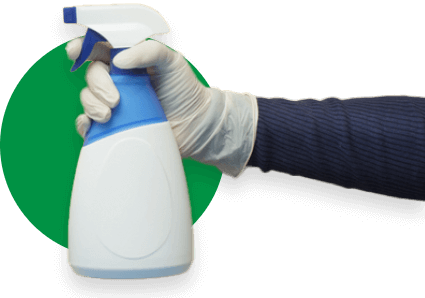After a long intermission, establishments, shops, and salons are happy to return to business as usual. Cleaning and disinfecting your facility is the best way to ensure the safety of yourselves and those you serve—the good news is that it happens to be our specialty. Dallas Janitorial Services wants to support you as you reopen your doors to serve your community in the wake of the coronavirus pandemic.
This article will focus on the best practices that businesses and individuals can follow in these uncertain times. To help alleviate any stress and inconveniences, we are always just one phone call away.
How COVID-19 spreads
Despite how new to us the coronavirus actually is (it’s not even a year old), scientists and agencies around the world have uncovered vital information about how it is transmitted so that we can protect ourselves from this highly contagious virus.
According to the Centers for Disease Control (CDC), the most common means of transmission from one person to another is by air droplets; for example, an infected individual coughs or sneezes, and the virus is inhaled by another person. This is why the CDC recommends that all individuals wear facial masks—a facial barrier will help to reduce the spread of this virus.
No evidence shows that the virus travels more than six to twelve feet, and facial coverings lessen your chances of breathing in these air droplets.
We don’t yet know how long the coronavirus can stay in the air, but we do know that the virus can live on surfaces anywhere from several hours to several days, depending on the materials and climate. Specific items that are known for transmitting the virus are referred to as fomites, which the CDC warns must be cleaned and sterilized as frequently as possible. Although aerial transmission is far more potent, we will discuss cleaning and disinfecting for COVID-19 from the air and surfaces.
Best Practices for Cleaning an Area With COVID-19
Before breaking out the disinfectants and sprays, here are some crucial pointers to remember:
Wear Facial Coverings
Masks are going to be an asset while cleaning, particularly if any dust or debris gets kicked up into the air. Most individuals don’t need medical-grade masks unless they are coming into contact with an infected person, but because we might encounter someone with the virus who has not yet shown symptoms, it is important to proceed with caution.
Wear Gloves and Full-Body Clothing
In short, the less skin exposed, the lower the chance of getting infected.
It’s not just the skin on your face that can be dangerous; if the virus is on your hands or other parts of your body, it can still make its way inside to your lungs. This is the reason why the CDC recommends that individuals avoid touching their faces as much as possible.
When it comes to clothing, the best option is to use a full-body suit or coveralls. This way, you can remove the suit after cleaning without contaminating your regular clothes. You should also have a system in place for disinfecting these coveralls after each session.
Maintain Adequate Ventilation
The virus travels best through the air, but cleaners and disinfectants often produce heavy fumes. If the building or room doesn’t have adequate ventilation, you’ll have to plan accordingly. In some cases, it might be best to get a mask that filters the air so you can breathe normally while working.
Don’t Mix Cleaners
You won’t need to go nuclear to sterilize your office or workspace—most cleaning agents are sufficient at killing the novel coronavirus. However, if you choose to use multiple chemicals, avoid mixing them at all costs. In many instances, the combination can produce toxic fumes that could do more damage than the actual virus you are trying to eliminate. If you plan to clean the same surface with multiple solutions, be sure to dry it off well between adding the new coat of cleaning solution.
Cleaning Hard Surfaces
Most commercial surfaces are made of non-porous materials such as stainless steel, glass, hardwood, or plastic, and these surfaces are the easiest to clean.
Here are the best steps to follow:
- Wash the surface with soap and water to remove any visible dirt or grime
- Rinse off any excess soap and dry thoroughly to avoid pooling
- Spray disinfectant and wipe the surface completely
- For the coronavirus, the recommended wait time is 10 minutes to ensure the virus is dead.
- After 10 minutes, you can rinse the surface again with water. This step eliminates any residue and can help remove dead bacteria and viruses as well.
- Dry the surface thoroughly with a disposable towel or let it air dry. Be sure to check for any pools of water.
Cleaning Soft Surfaces
The most common soft surface is carpeting, but clothing, furniture, and drapes are also porous and potential hazards. If possible, you’ll want to bag up the item and take it to the laundromat for deep cleaning. For non-movable things like carpet, however, you’ll need to make sure to use cleaning agents designed specifically for that surface. For example, carpet cleaners shouldn’t be used on padded chairs, and vice versa. Again, allow the disinfectant to remain on the surface for at least 10 minutes before wiping off or drying (i.e., with a fan).
Contact Dallas Janitorial Services Today
This may sound like a lot of work, and that’s because it is. These days, businesses can’t afford to take risks, and failure to provide a clean working environment can be a legal liability.
Instead, trust the professionals to handle these steps for you.
Dallas Janitorial Services can ensure that your business will be COVID-free—heavy traffic areas, such as bathrooms and lobbies, and private work areas, including conference rooms, copy rooms, and the corner office—we know exactly what to do, where to do it, and how to do it well. Call us today and let us clean your business properly.






